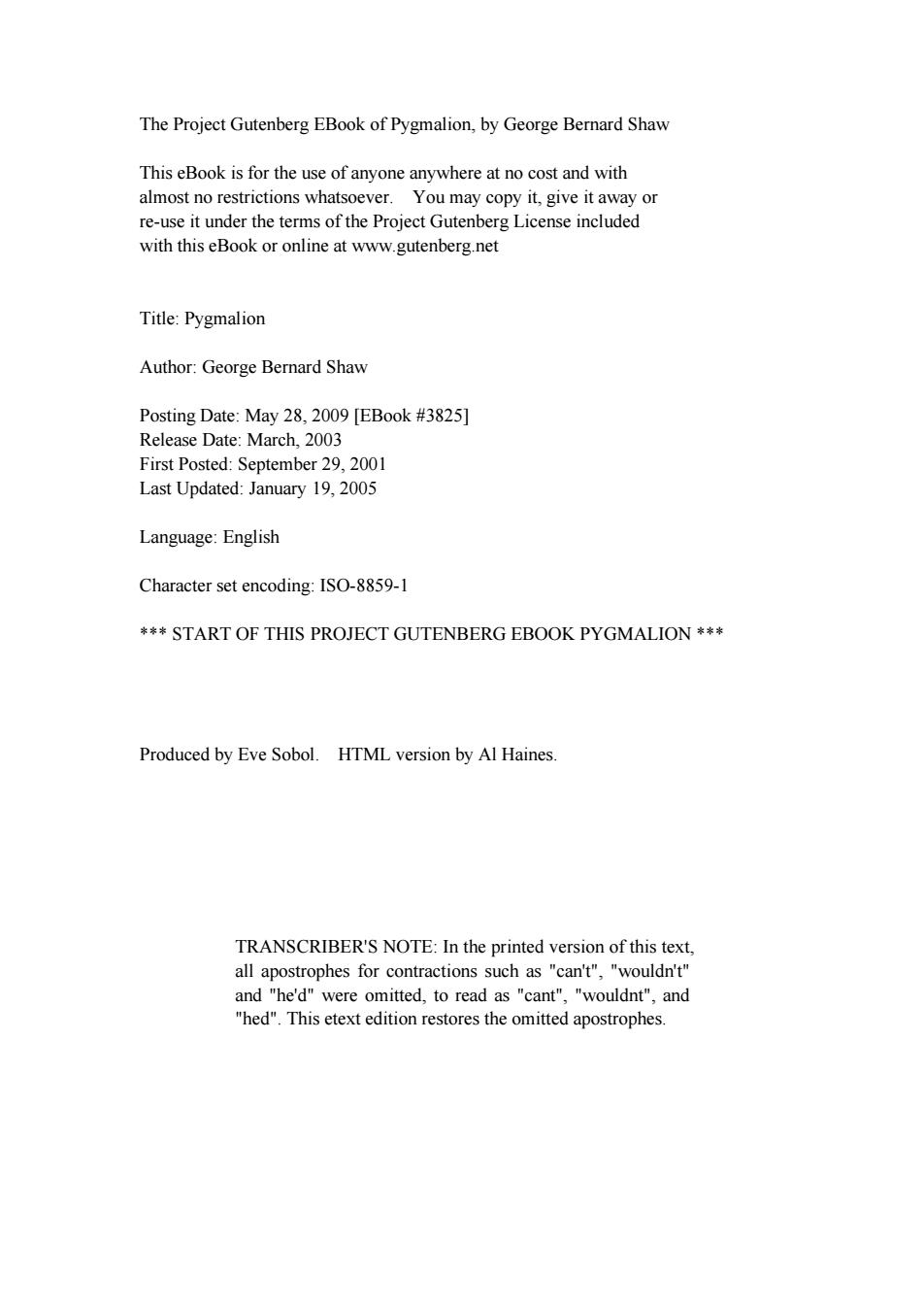
The Project Gutenberg EBook of Pygmalion,by George Bernard Shaw This eBook is for the use of anyone anywhere at no cost and with almost no restrictions whatsoever.You may copy it,give it away or re-use it under the terms of the Project Gutenberg License included with this eBook or online at www.gutenberg.net Title:Pygmalion Author:George Bernard Shaw Posting Date:May 28,2009 [EBook #3825] Release Date:March,2003 First Posted:September 29,2001 Last Updated:January 19,2005 Language:English Character set encoding:ISO-8859-1 **START OF THIS PROJECT GUTENBERG EBOOK PYGMALION ** Produced by Eve Sobol.HTML version by Al Haines. TRANSCRIBER'S NOTE:In the printed version of this text, all apostrophes for contractions such as "can't","wouldn't" and "he'd"were omitted,to read as "cant","wouldnt",and "hed".This etext edition restores the omitted apostrophes
The Project Gutenberg EBook of Pygmalion, by George Bernard Shaw This eBook is for the use of anyone anywhere at no cost and with almost no restrictions whatsoever. You may copy it, give it away or re-use it under the terms of the Project Gutenberg License included with this eBook or online at www.gutenberg.net Title: Pygmalion Author: George Bernard Shaw Posting Date: May 28, 2009 [EBook #3825] Release Date: March, 2003 First Posted: September 29, 2001 Last Updated: January 19, 2005 Language: English Character set encoding: ISO-8859-1 *** START OF THIS PROJECT GUTENBERG EBOOK PYGMALION *** Produced by Eve Sobol. HTML version by Al Haines. TRANSCRIBER'S NOTE: In the printed version of this text, all apostrophes for contractions such as "can't", "wouldn't" and "he'd" were omitted, to read as "cant", "wouldnt", and "hed". This etext edition restores the omitted apostrophes

PYGMALION BERNARD SHAW 1912 PREFACE TO PYGMALION. A Professor of Phonetics. As will be seen later on,Pygmalion needs,not a preface,but a sequel,which I have supplied in its due place.The English have no respect for their language,and will not teach their children to speak it.They spell it so abominably that no man can teach himself what it sounds like.It is impossible for an Englishman to open his mouth without making some other Englishman hate or despise him.German and Spanish are accessible to foreigners:English is not accessible even to Englishmen. The reformer England needs today is an energetic phonetic enthusiast:that is why I have made such a one the hero of a popular play.There have been heroes of that kind crying in the wilderness for many years past.When I became interested in the subject towards the end of the eighteen-seventies,Melville Bell was dead;but Alexander J. Ellis was still a living patriarch,with an impressive head always covered by a velvet skull cap,for which he would apologize to public meetings in a very courtly manner. He and Tito Pagliardini,another phonetic veteran,were men whom it was impossible to dislike.Henry Sweet,then a young man,lacked their sweetness of character:he was about as conciliatory to conventional mortals as Ibsen or Samuel Butler.His great ability as a phonetician (he was,I think,the best of them all at his job)would have entitled him to high official recognition,and perhaps enabled him to popularize his subject,but for his Satanic contempt for all academic dignitaries and persons in general who thought more of Greek than of phonetics.Once,in the days when the Imperial Institute rose in South Kensington,and Joseph Chamberlain was booming the Empire,I induced the editor of a leading monthly review to commission an article from Sweet on the imperial importance of his subject.When it arrived,it contained nothing but a savagely derisive attack on a professor of language and literature whose chair Sweet regarded as proper to a phonetic expert only.The article,being libelous, had to be returned as impossible;and I had to renounce my dream of dragging its author into the limelight.When I met him afterwards,for the first time for many years I found to my astonishment that he,who had been a quite tolerably presentable young man,had actually managed by sheer scorn to alter his personal appearance until he had become a sort of walking repudiation of Oxford and all its traditions.It must have been largely in his own despite that he was squeezed into something called a Readership of phonetics there.The future of phonetics rests probably with his pupils
PYGMALION BERNARD SHAW 1912 PREFACE TO PYGMALION. A Professor of Phonetics. As will be seen later on, Pygmalion needs, not a preface, but a sequel, which I have supplied in its due place. The English have no respect for their language, and will not teach their children to speak it. They spell it so abominably that no man can teach himself what it sounds like. It is impossible for an Englishman to open his mouth without making some other Englishman hate or despise him. German and Spanish are accessible to foreigners: English is not accessible even to Englishmen. The reformer England needs today is an energetic phonetic enthusiast: that is why I have made such a one the hero of a popular play. There have been heroes of that kind crying in the wilderness for many years past. When I became interested in the subject towards the end of the eighteen-seventies, Melville Bell was dead; but Alexander J. Ellis was still a living patriarch, with an impressive head always covered by a velvet skull cap, for which he would apologize to public meetings in a very courtly manner. He and Tito Pagliardini, another phonetic veteran, were men whom it was impossible to dislike. Henry Sweet, then a young man, lacked their sweetness of character: he was about as conciliatory to conventional mortals as Ibsen or Samuel Butler. His great ability as a phonetician (he was, I think, the best of them all at his job) would have entitled him to high official recognition, and perhaps enabled him to popularize his subject, but for his Satanic contempt for all academic dignitaries and persons in general who thought more of Greek than of phonetics. Once, in the days when the Imperial Institute rose in South Kensington, and Joseph Chamberlain was booming the Empire, I induced the editor of a leading monthly review to commission an article from Sweet on the imperial importance of his subject. When it arrived, it contained nothing but a savagely derisive attack on a professor of language and literature whose chair Sweet regarded as proper to a phonetic expert only. The article, being libelous, had to be returned as impossible; and I had to renounce my dream of dragging its author into the limelight. When I met him afterwards, for the first time for many years, I found to my astonishment that he, who had been a quite tolerably presentable young man, had actually managed by sheer scorn to alter his personal appearance until he had become a sort of walking repudiation of Oxford and all its traditions. It must have been largely in his own despite that he was squeezed into something called a Readership of phonetics there. The future of phonetics rests probably with his pupils

who all swore by him;but nothing could bring the man himself into any sort of compliance with the university,to which he nevertheless clung by divine right in an intensely Oxonian way.I daresay his papers,if he has left any,include some satires that may be published without too destructive results fifty years hence.He was,I believe,not in the least an ill-natured man:very much the opposite,I should say;but he would not suffer fools gladly Those who knew him will recognize in my third act the allusion to the patent Shorthand in which he used to write postcards,and which may be acquired from a four and six-penny manual published by the Clarendon Press.The postcards which Mrs.Higgins describes are such as I have received from Sweet.I would decipher a sound which a cockney would represent by zerr,and a Frenchman by seu,and then write demanding with some heat what on earth it meant.Sweet,with boundless contempt for my stupidity,would reply that it not only meant but obviously was the word Result,as no other Word containing that sound,and capable of making sense with the context,existed in any language spoken on earth.That less expert mortals should require fuller indications was beyond Sweet's patience.Therefore,though the whole point of his "Current Shorthand"is that it can express every sound in the language perfectly,vowels as well as consonants,and that your hand has to make no stroke except the easy and current ones with which you write m,n,and u,1,p,and q, scribbling them at whatever angle comes easiest to you,his unfortunate determination to make this remarkable and quite legible script serve also as a Shorthand reduced it in his own practice to the most inscrutable of cryptograms.His true objective was the provision of a full,accurate,legible script for our noble but ill-dressed language;but he was led past that by his contempt for the popular Pitman system of Shorthand, which he called the Pitfall system.The triumph of Pitman was a triumph of business organization:there was a weekly paper to persuade you to learn Pitman:there were cheap textbooks and exercise books and transcripts of speeches for you to copy,and schools where experienced teachers coached you up to the necessary proficiency. Sweet could not organize his market in that fashion.He might as well have been the Sybil who tore up the leaves of prophecy that nobody would attend to.The four and six-penny manual,mostly in his lithographed handwriting,that was never vulgarly advertized,may perhaps some day be taken up by a syndicate and pushed upon the public as The Times pushed the Encyclopaedia Britannica;but until then it will certainly not prevail against Pitman.I have bought three copies of it during my lifetime;and I am informed by the publishers that its cloistered existence is still a steady and healthy one.I actually learned the system two several times;and yet the shorthand in which I am writing these lines is Pitman's.And the reason is,that my secretary cannot transcribe Sweet,having been perforce taught in the schools of Pitman.Therefore,Sweet railed at Pitman as vainly as Thersites railed at Ajax:his raillery,however it may have eased his soul,gave no popular vogue to Current Shorthand.Pygmalion Higgins is not a portrait of Sweet,to whom the adventure of Eliza Doolittle would have been impossible;still,as will be seen,there are touches of Sweet in the play.With Higgins's physique and temperament Sweet might have set
who all swore by him; but nothing could bring the man himself into any sort of compliance with the university, to which he nevertheless clung by divine right in an intensely Oxonian way. I daresay his papers, if he has left any, include some satires that may be published without too destructive results fifty years hence. He was, I believe, not in the least an ill-natured man: very much the opposite, I should say; but he would not suffer fools gladly. Those who knew him will recognize in my third act the allusion to the patent Shorthand in which he used to write postcards, and which may be acquired from a four and six-penny manual published by the Clarendon Press. The postcards which Mrs. Higgins describes are such as I have received from Sweet. I would decipher a sound which a cockney would represent by zerr, and a Frenchman by seu, and then write demanding with some heat what on earth it meant. Sweet, with boundless contempt for my stupidity, would reply that it not only meant but obviously was the word Result, as no other Word containing that sound, and capable of making sense with the context, existed in any language spoken on earth. That less expert mortals should require fuller indications was beyond Sweet's patience. Therefore, though the whole point of his "Current Shorthand" is that it can express every sound in the language perfectly, vowels as well as consonants, and that your hand has to make no stroke except the easy and current ones with which you write m, n, and u, l, p, and q, scribbling them at whatever angle comes easiest to you, his unfortunate determination to make this remarkable and quite legible script serve also as a Shorthand reduced it in his own practice to the most inscrutable of cryptograms. His true objective was the provision of a full, accurate, legible script for our noble but ill-dressed language; but he was led past that by his contempt for the popular Pitman system of Shorthand, which he called the Pitfall system. The triumph of Pitman was a triumph of business organization: there was a weekly paper to persuade you to learn Pitman: there were cheap textbooks and exercise books and transcripts of speeches for you to copy, and schools where experienced teachers coached you up to the necessary proficiency. Sweet could not organize his market in that fashion. He might as well have been the Sybil who tore up the leaves of prophecy that nobody would attend to. The four and six-penny manual, mostly in his lithographed handwriting, that was never vulgarly advertized, may perhaps some day be taken up by a syndicate and pushed upon the public as The Times pushed the Encyclopaedia Britannica; but until then it will certainly not prevail against Pitman. I have bought three copies of it during my lifetime; and I am informed by the publishers that its cloistered existence is still a steady and healthy one. I actually learned the system two several times; and yet the shorthand in which I am writing these lines is Pitman's. And the reason is, that my secretary cannot transcribe Sweet, having been perforce taught in the schools of Pitman. Therefore, Sweet railed at Pitman as vainly as Thersites railed at Ajax: his raillery, however it may have eased his soul, gave no popular vogue to Current Shorthand. Pygmalion Higgins is not a portrait of Sweet, to whom the adventure of Eliza Doolittle would have been impossible; still, as will be seen, there are touches of Sweet in the play. With Higgins's physique and temperament Sweet might have set
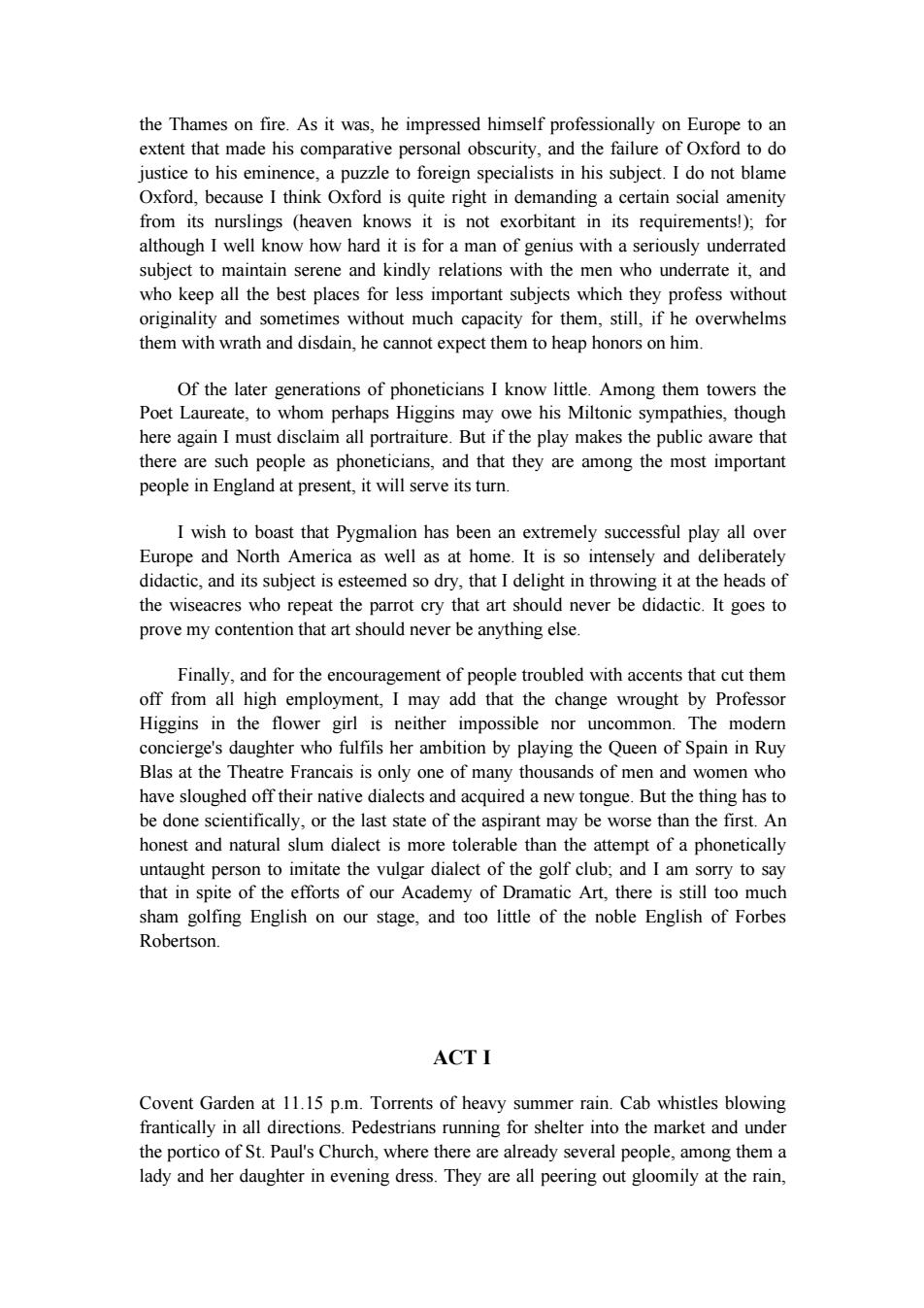
the Thames on fire.As it was,he impressed himself professionally on Europe to an extent that made his comparative personal obscurity,and the failure of Oxford to do justice to his eminence,a puzzle to foreign specialists in his subject.I do not blame Oxford,because I think Oxford is quite right in demanding a certain social amenity from its nurslings (heaven knows it is not exorbitant in its requirements!);for although I well know how hard it is for a man of genius with a seriously underrated subject to maintain serene and kindly relations with the men who underrate it,and who keep all the best places for less important subjects which they profess without originality and sometimes without much capacity for them,still,if he overwhelms them with wrath and disdain,he cannot expect them to heap honors on him. Of the later generations of phoneticians I know little.Among them towers the Poet Laureate,to whom perhaps Higgins may owe his Miltonic sympathies,though here again I must disclaim all portraiture.But if the play makes the public aware that there are such people as phoneticians,and that they are among the most important people in England at present,it will serve its turn. I wish to boast that Pygmalion has been an extremely successful play all over Europe and North America as well as at home.It is so intensely and deliberately didactic,and its subject is esteemed so dry,that I delight in throwing it at the heads of the wiseacres who repeat the parrot cry that art should never be didactic.It goes to prove my contention that art should never be anything else. Finally,and for the encouragement of people troubled with accents that cut them off from all high employment,I may add that the change wrought by Professor Higgins in the flower girl is neither impossible nor uncommon.The modern concierge's daughter who fulfils her ambition by playing the Queen of Spain in Ruy Blas at the Theatre Francais is only one of many thousands of men and women who have sloughed off their native dialects and acquired a new tongue.But the thing has to be done scientifically,or the last state of the aspirant may be worse than the first.An honest and natural slum dialect is more tolerable than the attempt of a phonetically untaught person to imitate the vulgar dialect of the golf club;and I am sorry to say that in spite of the efforts of our Academy of Dramatic Art,there is still too much sham golfing English on our stage,and too little of the noble English of Forbes Robertson. ACT I Covent Garden at 11.15 p.m.Torrents of heavy summer rain.Cab whistles blowing frantically in all directions.Pedestrians running for shelter into the market and under the portico of St.Paul's Church,where there are already several people,among them a lady and her daughter in evening dress.They are all peering out gloomily at the rain
the Thames on fire. As it was, he impressed himself professionally on Europe to an extent that made his comparative personal obscurity, and the failure of Oxford to do justice to his eminence, a puzzle to foreign specialists in his subject. I do not blame Oxford, because I think Oxford is quite right in demanding a certain social amenity from its nurslings (heaven knows it is not exorbitant in its requirements!); for although I well know how hard it is for a man of genius with a seriously underrated subject to maintain serene and kindly relations with the men who underrate it, and who keep all the best places for less important subjects which they profess without originality and sometimes without much capacity for them, still, if he overwhelms them with wrath and disdain, he cannot expect them to heap honors on him. Of the later generations of phoneticians I know little. Among them towers the Poet Laureate, to whom perhaps Higgins may owe his Miltonic sympathies, though here again I must disclaim all portraiture. But if the play makes the public aware that there are such people as phoneticians, and that they are among the most important people in England at present, it will serve its turn. I wish to boast that Pygmalion has been an extremely successful play all over Europe and North America as well as at home. It is so intensely and deliberately didactic, and its subject is esteemed so dry, that I delight in throwing it at the heads of the wiseacres who repeat the parrot cry that art should never be didactic. It goes to prove my contention that art should never be anything else. Finally, and for the encouragement of people troubled with accents that cut them off from all high employment, I may add that the change wrought by Professor Higgins in the flower girl is neither impossible nor uncommon. The modern concierge's daughter who fulfils her ambition by playing the Queen of Spain in Ruy Blas at the Theatre Francais is only one of many thousands of men and women who have sloughed off their native dialects and acquired a new tongue. But the thing has to be done scientifically, or the last state of the aspirant may be worse than the first. An honest and natural slum dialect is more tolerable than the attempt of a phonetically untaught person to imitate the vulgar dialect of the golf club; and I am sorry to say that in spite of the efforts of our Academy of Dramatic Art, there is still too much sham golfing English on our stage, and too little of the noble English of Forbes Robertson. ACT I Covent Garden at 11.15 p.m. Torrents of heavy summer rain. Cab whistles blowing frantically in all directions. Pedestrians running for shelter into the market and under the portico of St. Paul's Church, where there are already several people, among them a lady and her daughter in evening dress. They are all peering out gloomily at the rain
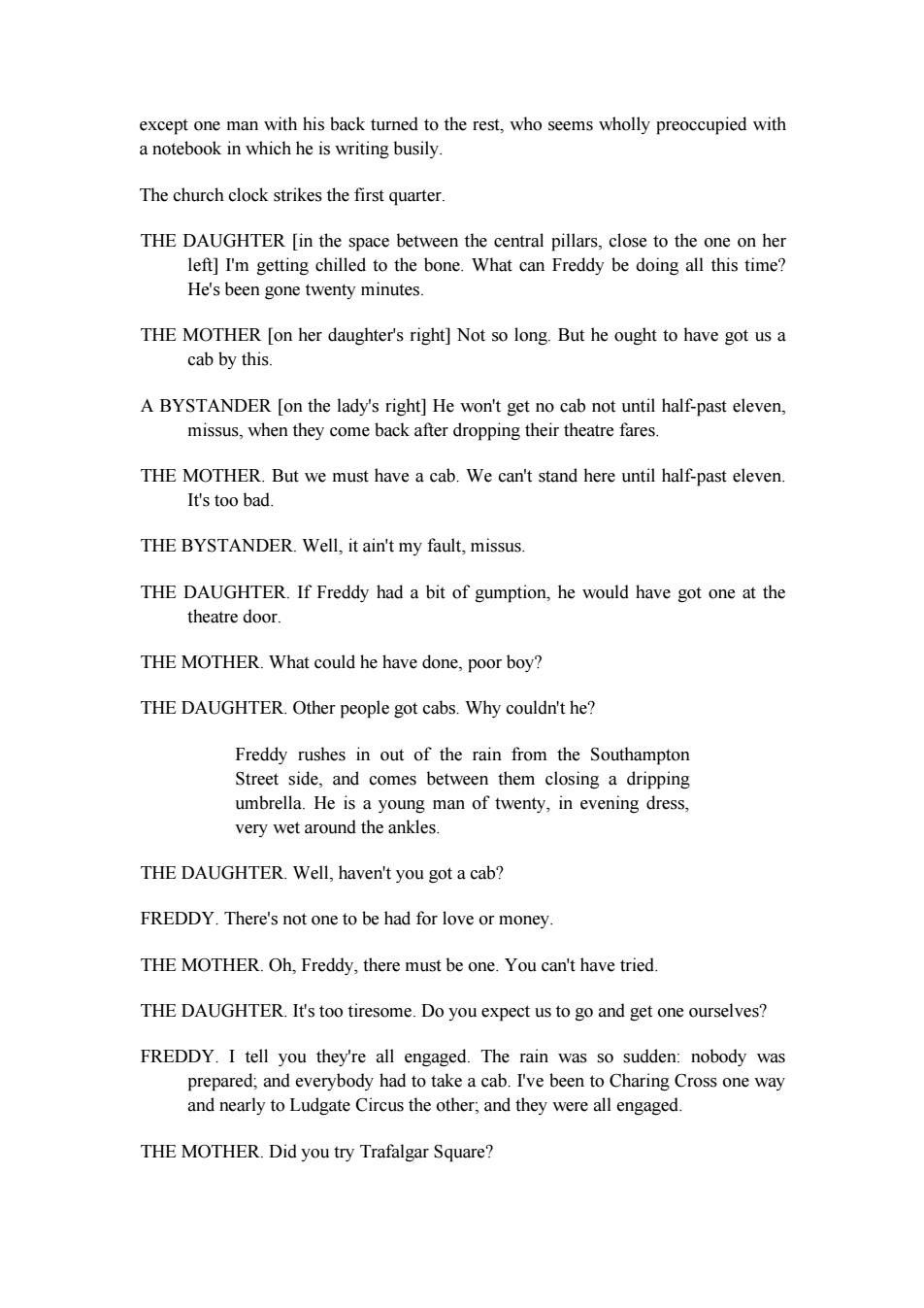
except one man with his back turned to the rest,who seems wholly preoccupied with a notebook in which he is writing busily The church clock strikes the first quarter. THE DAUGHTER [in the space between the central pillars,close to the one on her left]I'm getting chilled to the bone.What can Freddy be doing all this time? He's been gone twenty minutes. THE MOTHER [on her daughter's right]Not so long.But he ought to have got us a cab by this. A BYSTANDER [on the lady's right]He won't get no cab not until half-past eleven, missus,when they come back after dropping their theatre fares. THE MOTHER.But we must have a cab.We can't stand here until half-past eleven. It's too bad. THE BYSTANDER.Well,it ain't my fault,missus. THE DAUGHTER.If Freddy had a bit of gumption,he would have got one at the theatre door. THE MOTHER.What could he have done,poor boy? THE DAUGHTER.Other people got cabs.Why couldn't he? Freddy rushes in out of the rain from the Southampton Street side,and comes between them closing a dripping umbrella.He is a young man of twenty,in evening dress, very wet around the ankles. THE DAUGHTER.Well,haven't you got a cab? FREDDY.There's not one to be had for love or money. THE MOTHER.Oh,Freddy,there must be one.You can't have tried. THE DAUGHTER.It's too tiresome.Do you expect us to go and get one ourselves? FREDDY.I tell you they're all engaged.The rain was so sudden:nobody was prepared;and everybody had to take a cab.I've been to Charing Cross one way and nearly to Ludgate Circus the other;and they were all engaged. THE MOTHER.Did you try Trafalgar Square?
except one man with his back turned to the rest, who seems wholly preoccupied with a notebook in which he is writing busily. The church clock strikes the first quarter. THE DAUGHTER [in the space between the central pillars, close to the one on her left] I'm getting chilled to the bone. What can Freddy be doing all this time? He's been gone twenty minutes. THE MOTHER [on her daughter's right] Not so long. But he ought to have got us a cab by this. A BYSTANDER [on the lady's right] He won't get no cab not until half-past eleven, missus, when they come back after dropping their theatre fares. THE MOTHER. But we must have a cab. We can't stand here until half-past eleven. It's too bad. THE BYSTANDER. Well, it ain't my fault, missus. THE DAUGHTER. If Freddy had a bit of gumption, he would have got one at the theatre door. THE MOTHER. What could he have done, poor boy? THE DAUGHTER. Other people got cabs. Why couldn't he? Freddy rushes in out of the rain from the Southampton Street side, and comes between them closing a dripping umbrella. He is a young man of twenty, in evening dress, very wet around the ankles. THE DAUGHTER. Well, haven't you got a cab? FREDDY. There's not one to be had for love or money. THE MOTHER. Oh, Freddy, there must be one. You can't have tried. THE DAUGHTER. It's too tiresome. Do you expect us to go and get one ourselves? FREDDY. I tell you they're all engaged. The rain was so sudden: nobody was prepared; and everybody had to take a cab. I've been to Charing Cross one way and nearly to Ludgate Circus the other; and they were all engaged. THE MOTHER. Did you try Trafalgar Square?
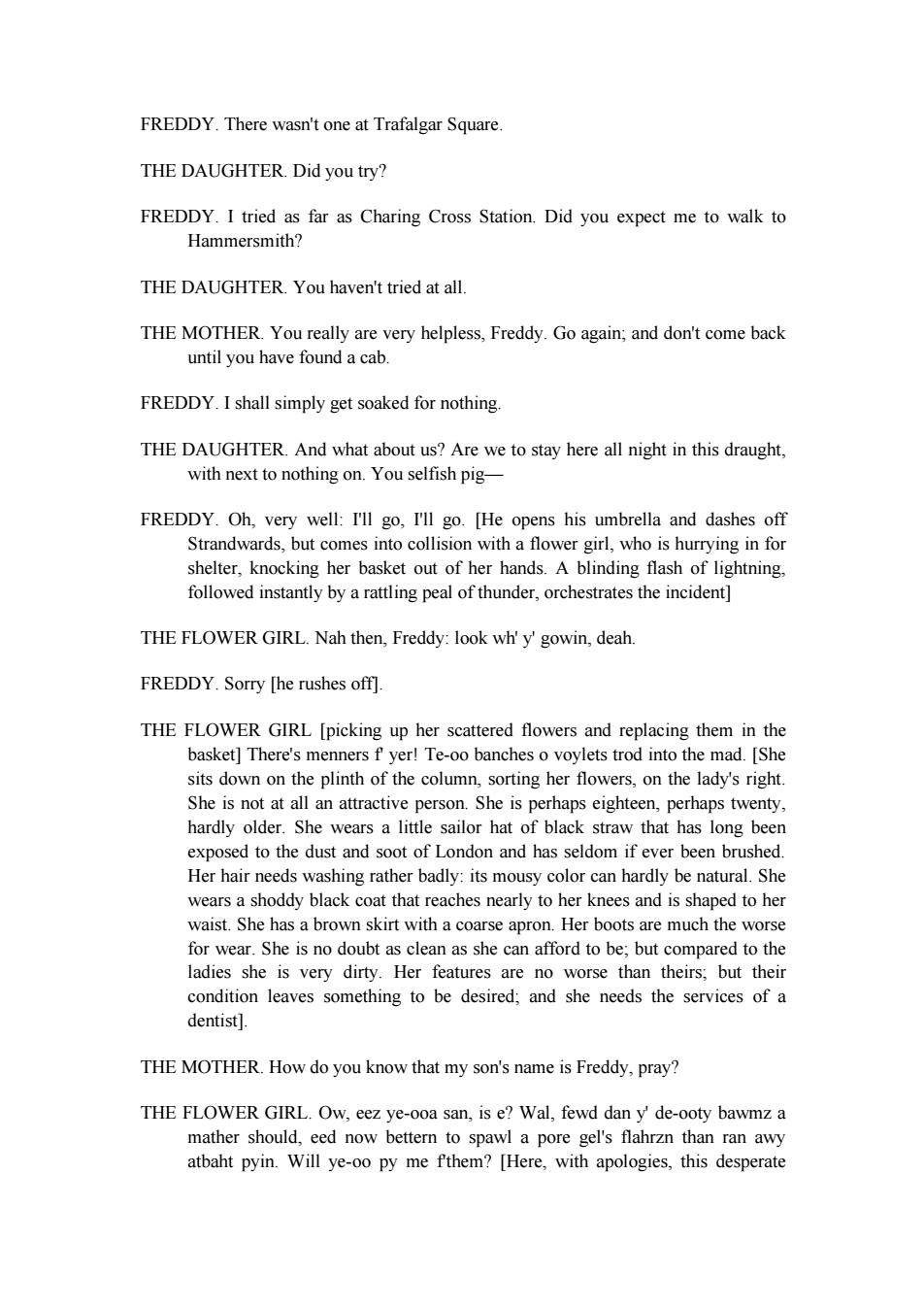
FREDDY.There wasn't one at Trafalgar Square. THE DAUGHTER.Did you try? FREDDY.I tried as far as Charing Cross Station.Did you expect me to walk to Hammersmith? THE DAUGHTER.You haven't tried at all. THE MOTHER.You really are very helpless,Freddy.Go again;and don't come back until you have found a cab. FREDDY.I shall simply get soaked for nothing. THE DAUGHTER.And what about us?Are we to stay here all night in this draught, with next to nothing on.You selfish pig- FREDDY.Oh,very well:I'll go,I'll go.[He opens his umbrella and dashes off Strandwards,but comes into collision with a flower girl,who is hurrying in for shelter,knocking her basket out of her hands.A blinding flash of lightning, followed instantly by a rattling peal of thunder,orchestrates the incident] THE FLOWER GIRL.Nah then,Freddy:look wh'y'gowin,deah. FREDDY.Sorry [he rushes off]. THE FLOWER GIRL [picking up her scattered flowers and replacing them in the basket]There's menners f yer!Te-oo banches o voylets trod into the mad.[She sits down on the plinth of the column,sorting her flowers,on the lady's right. She is not at all an attractive person.She is perhaps eighteen,perhaps twenty, hardly older.She wears a little sailor hat of black straw that has long been exposed to the dust and soot of London and has seldom if ever been brushed. Her hair needs washing rather badly:its mousy color can hardly be natural.She wears a shoddy black coat that reaches nearly to her knees and is shaped to her waist.She has a brown skirt with a coarse apron.Her boots are much the worse for wear.She is no doubt as clean as she can afford to be;but compared to the ladies she is very dirty.Her features are no worse than theirs;but their condition leaves something to be desired;and she needs the services of a dentist]. THE MOTHER.How do you know that my son's name is Freddy,pray? THE FLOWER GIRL.Ow,eez ye-ooa san,is e?Wal,fewd dan y'de-ooty bawmz a mather should,eed now bettern to spawl a pore gel's flahrzn than ran awy atbaht pyin.Will ye-oo py me fthem?[Here,with apologies,this desperate
FREDDY. There wasn't one at Trafalgar Square. THE DAUGHTER. Did you try? FREDDY. I tried as far as Charing Cross Station. Did you expect me to walk to Hammersmith? THE DAUGHTER. You haven't tried at all. THE MOTHER. You really are very helpless, Freddy. Go again; and don't come back until you have found a cab. FREDDY. I shall simply get soaked for nothing. THE DAUGHTER. And what about us? Are we to stay here all night in this draught, with next to nothing on. You selfish pig— FREDDY. Oh, very well: I'll go, I'll go. [He opens his umbrella and dashes off Strandwards, but comes into collision with a flower girl, who is hurrying in for shelter, knocking her basket out of her hands. A blinding flash of lightning, followed instantly by a rattling peal of thunder, orchestrates the incident] THE FLOWER GIRL. Nah then, Freddy: look wh' y' gowin, deah. FREDDY. Sorry [he rushes off]. THE FLOWER GIRL [picking up her scattered flowers and replacing them in the basket] There's menners f' yer! Te-oo banches o voylets trod into the mad. [She sits down on the plinth of the column, sorting her flowers, on the lady's right. She is not at all an attractive person. She is perhaps eighteen, perhaps twenty, hardly older. She wears a little sailor hat of black straw that has long been exposed to the dust and soot of London and has seldom if ever been brushed. Her hair needs washing rather badly: its mousy color can hardly be natural. She wears a shoddy black coat that reaches nearly to her knees and is shaped to her waist. She has a brown skirt with a coarse apron. Her boots are much the worse for wear. She is no doubt as clean as she can afford to be; but compared to the ladies she is very dirty. Her features are no worse than theirs; but their condition leaves something to be desired; and she needs the services of a dentist]. THE MOTHER. How do you know that my son's name is Freddy, pray? THE FLOWER GIRL. Ow, eez ye-ooa san, is e? Wal, fewd dan y' de-ooty bawmz a mather should, eed now bettern to spawl a pore gel's flahrzn than ran awy atbaht pyin. Will ye-oo py me f'them? [Here, with apologies, this desperate
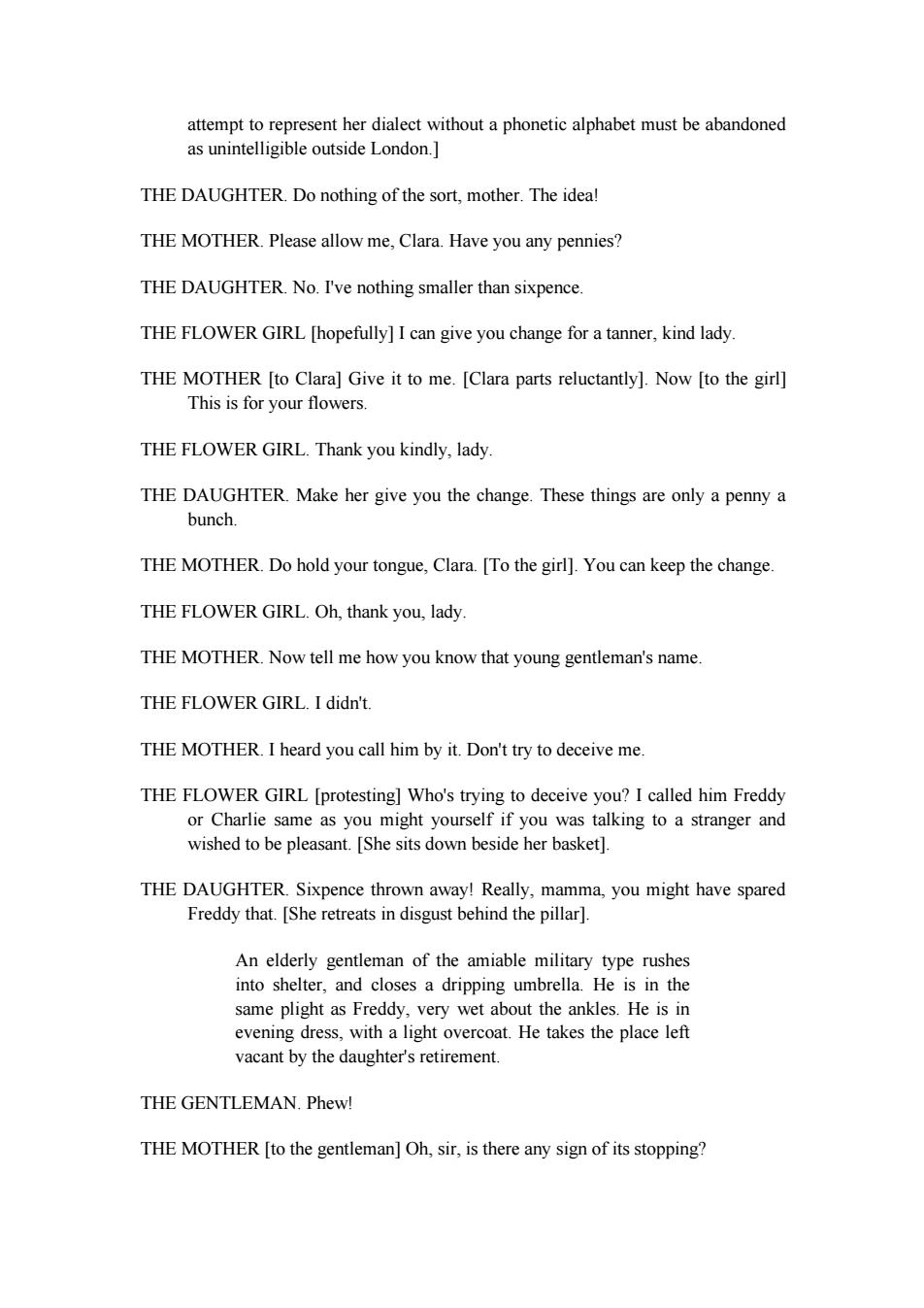
attempt to represent her dialect without a phonetic alphabet must be abandoned as unintelligible outside London.] THE DAUGHTER.Do nothing of the sort,mother.The idea! THE MOTHER.Please allow me,Clara.Have you any pennies? THE DAUGHTER.No.I've nothing smaller than sixpence. THE FLOWER GIRL [hopefully]I can give you change for a tanner,kind lady THE MOTHER [to Clara]Give it to me.[Clara parts reluctantly].Now [to the girl] This is for your flowers. THE FLOWER GIRL.Thank you kindly,lady. THE DAUGHTER.Make her give you the change.These things are only a penny a bunch. THE MOTHER.Do hold your tongue,Clara.[To the girl].You can keep the change. THE FLOWER GIRL.Oh,thank you,lady. THE MOTHER.Now tell me how you know that young gentleman's name. THE FLOWER GIRL.I didn't. THE MOTHER.I heard you call him by it.Don't try to deceive me. THE FLOWER GIRL [protesting]Who's trying to deceive you?I called him Freddy or Charlie same as you might yourself if you was talking to a stranger and wished to be pleasant.[She sits down beside her basket]. THE DAUGHTER.Sixpence thrown away!Really,mamma,you might have spared Freddy that.[She retreats in disgust behind the pillar]. An elderly gentleman of the amiable military type rushes into shelter,and closes a dripping umbrella.He is in the same plight as Freddy,very wet about the ankles.He is in evening dress,with a light overcoat.He takes the place left vacant by the daughter's retirement. THE GENTLEMAN.Phew! THE MOTHER [to the gentleman]Oh,sir,is there any sign of its stopping?
attempt to represent her dialect without a phonetic alphabet must be abandoned as unintelligible outside London.] THE DAUGHTER. Do nothing of the sort, mother. The idea! THE MOTHER. Please allow me, Clara. Have you any pennies? THE DAUGHTER. No. I've nothing smaller than sixpence. THE FLOWER GIRL [hopefully] I can give you change for a tanner, kind lady. THE MOTHER [to Clara] Give it to me. [Clara parts reluctantly]. Now [to the girl] This is for your flowers. THE FLOWER GIRL. Thank you kindly, lady. THE DAUGHTER. Make her give you the change. These things are only a penny a bunch. THE MOTHER. Do hold your tongue, Clara. [To the girl]. You can keep the change. THE FLOWER GIRL. Oh, thank you, lady. THE MOTHER. Now tell me how you know that young gentleman's name. THE FLOWER GIRL. I didn't. THE MOTHER. I heard you call him by it. Don't try to deceive me. THE FLOWER GIRL [protesting] Who's trying to deceive you? I called him Freddy or Charlie same as you might yourself if you was talking to a stranger and wished to be pleasant. [She sits down beside her basket]. THE DAUGHTER. Sixpence thrown away! Really, mamma, you might have spared Freddy that. [She retreats in disgust behind the pillar]. An elderly gentleman of the amiable military type rushes into shelter, and closes a dripping umbrella. He is in the same plight as Freddy, very wet about the ankles. He is in evening dress, with a light overcoat. He takes the place left vacant by the daughter's retirement. THE GENTLEMAN. Phew! THE MOTHER [to the gentleman] Oh, sir, is there any sign of its stopping?
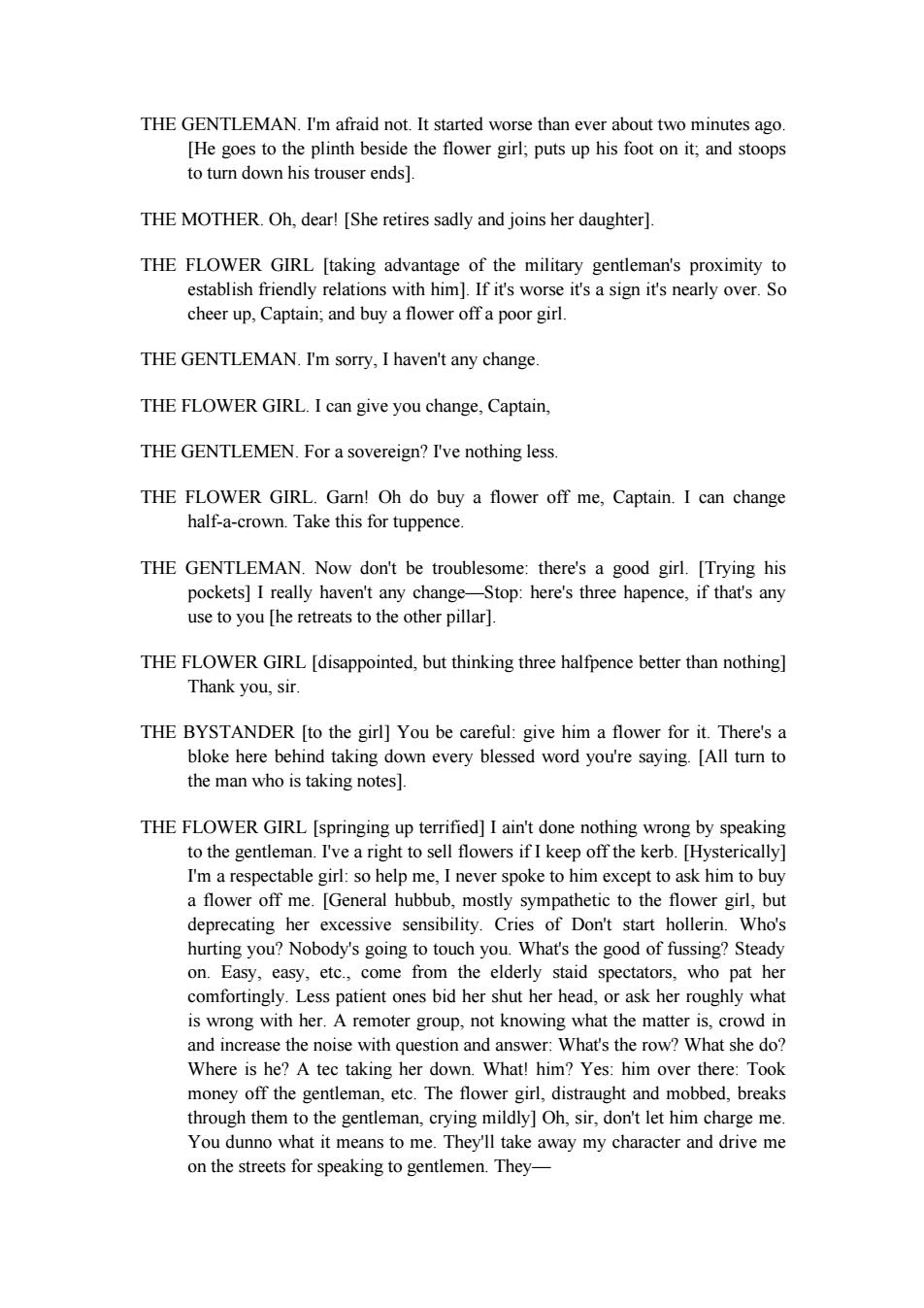
THE GENTLEMAN.I'm afraid not.It started worse than ever about two minutes ago. [He goes to the plinth beside the flower girl;puts up his foot on it;and stoops to turn down his trouser ends]. THE MOTHER.Oh,dear![She retires sadly and joins her daughter]. THE FLOWER GIRL [taking advantage of the military gentleman's proximity to establish friendly relations with him].If it's worse it's a sign it's nearly over.So cheer up,Captain;and buy a flower off a poor girl. THE GENTLEMAN.I'm sorry,I haven't any change. THE FLOWER GIRL.I can give you change,Captain, THE GENTLEMEN.For a sovereign?I've nothing less. THE FLOWER GIRL.Garn!Oh do buy a flower off me,Captain.I can change half-a-crown.Take this for tuppence. THE GENTLEMAN.Now don't be troublesome:there's a good girl.[Trying his pockets]I really haven't any change-Stop:here's three hapence,if that's any use to you [he retreats to the other pillar]. THE FLOWER GIRL [disappointed,but thinking three halfpence better than nothing] Thank you,sir. THE BYSTANDER [to the girl]You be careful:give him a flower for it.There's a bloke here behind taking down every blessed word you're saying.[All turn to the man who is taking notes]. THE FLOWER GIRL [springing up terrified]I ain't done nothing wrong by speaking to the gentleman.I've a right to sell flowers if I keep off the kerb.[Hysterically] I'm a respectable girl:so help me,I never spoke to him except to ask him to buy a flower off me.[General hubbub,mostly sympathetic to the flower girl,but deprecating her excessive sensibility.Cries of Don't start hollerin.Who's hurting you?Nobody's going to touch you.What's the good of fussing?Steady on.Easy,easy,etc.,come from the elderly staid spectators,who pat her comfortingly.Less patient ones bid her shut her head,or ask her roughly what is wrong with her.A remoter group,not knowing what the matter is,crowd in and increase the noise with question and answer:What's the row?What she do? Where is he?A tec taking her down.What!him?Yes:him over there:Took money off the gentleman,etc.The flower girl,distraught and mobbed,breaks through them to the gentleman,crying mildly]Oh,sir,don't let him charge me. You dunno what it means to me.They'll take away my character and drive me on the streets for speaking to gentlemen.They-
THE GENTLEMAN. I'm afraid not. It started worse than ever about two minutes ago. [He goes to the plinth beside the flower girl; puts up his foot on it; and stoops to turn down his trouser ends]. THE MOTHER. Oh, dear! [She retires sadly and joins her daughter]. THE FLOWER GIRL [taking advantage of the military gentleman's proximity to establish friendly relations with him]. If it's worse it's a sign it's nearly over. So cheer up, Captain; and buy a flower off a poor girl. THE GENTLEMAN. I'm sorry, I haven't any change. THE FLOWER GIRL. I can give you change, Captain, THE GENTLEMEN. For a sovereign? I've nothing less. THE FLOWER GIRL. Garn! Oh do buy a flower off me, Captain. I can change half-a-crown. Take this for tuppence. THE GENTLEMAN. Now don't be troublesome: there's a good girl. [Trying his pockets] I really haven't any change—Stop: here's three hapence, if that's any use to you [he retreats to the other pillar]. THE FLOWER GIRL [disappointed, but thinking three halfpence better than nothing] Thank you, sir. THE BYSTANDER [to the girl] You be careful: give him a flower for it. There's a bloke here behind taking down every blessed word you're saying. [All turn to the man who is taking notes]. THE FLOWER GIRL [springing up terrified] I ain't done nothing wrong by speaking to the gentleman. I've a right to sell flowers if I keep off the kerb. [Hysterically] I'm a respectable girl: so help me, I never spoke to him except to ask him to buy a flower off me. [General hubbub, mostly sympathetic to the flower girl, but deprecating her excessive sensibility. Cries of Don't start hollerin. Who's hurting you? Nobody's going to touch you. What's the good of fussing? Steady on. Easy, easy, etc., come from the elderly staid spectators, who pat her comfortingly. Less patient ones bid her shut her head, or ask her roughly what is wrong with her. A remoter group, not knowing what the matter is, crowd in and increase the noise with question and answer: What's the row? What she do? Where is he? A tec taking her down. What! him? Yes: him over there: Took money off the gentleman, etc. The flower girl, distraught and mobbed, breaks through them to the gentleman, crying mildly] Oh, sir, don't let him charge me. You dunno what it means to me. They'll take away my character and drive me on the streets for speaking to gentlemen. They—
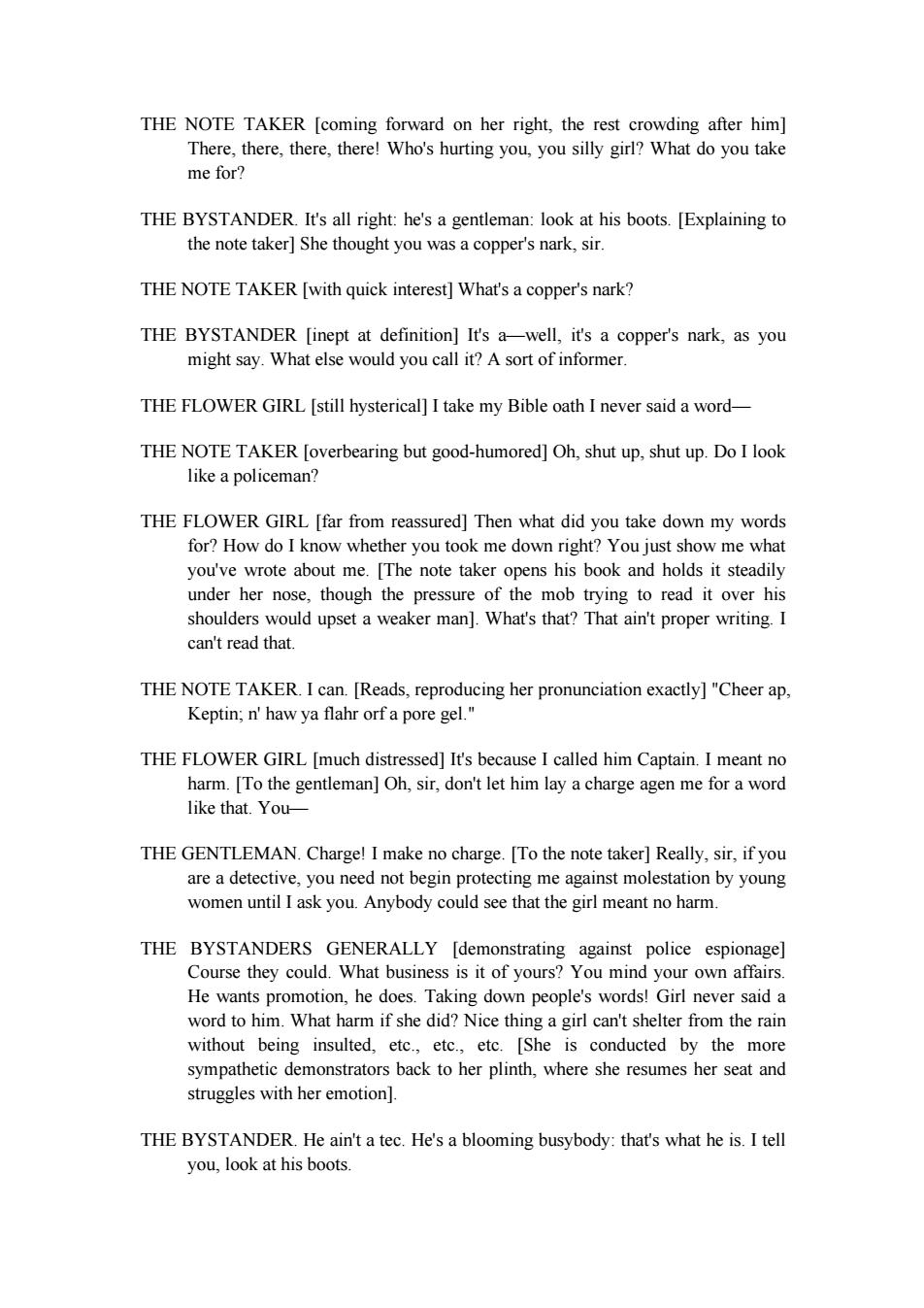
THE NOTE TAKER [coming forward on her right,the rest crowding after him] There,there,there,there!Who's hurting you,you silly girl?What do you take me for? THE BYSTANDER.It's all right:he's a gentleman:look at his boots.[Explaining to the note taker]She thought you was a copper's nark,sir. THE NOTE TAKER [with quick interest]What's a copper's nark? THE BYSTANDER [inept at definition]It's a-well,it's a copper's nark,as you might say.What else would you call it?A sort of informer. THE FLOWER GIRL [still hysterical]I take my Bible oath I never said a word- THE NOTE TAKER [overbearing but good-humored]Oh,shut up,shut up.Do I look like a policeman? THE FLOWER GIRL [far from reassured]Then what did you take down my words for?How do I know whether you took me down right?You just show me what you've wrote about me.[The note taker opens his book and holds it steadily under her nose,though the pressure of the mob trying to read it over his shoulders would upset a weaker man].What's that?That ain't proper writing.I can't read that. THE NOTE TAKER.I can.[Reads,reproducing her pronunciation exactly]"Cheer ap, Keptin;n'haw ya flahr orf a pore gel." THE FLOWER GIRL [much distressed]It's because I called him Captain.I meant no harm.[To the gentleman]Oh,sir,don't let him lay a charge agen me for a word like that.You- THE GENTLEMAN.Charge!I make no charge.[To the note taker]Really,sir,if you are a detective,you need not begin protecting me against molestation by young women until I ask you.Anybody could see that the girl meant no harm. THE BYSTANDERS GENERALLY [demonstrating against police espionage] Course they could.What business is it of yours?You mind your own affairs. He wants promotion,he does.Taking down people's words!Girl never said a word to him.What harm if she did?Nice thing a girl can't shelter from the rain without being insulted,etc.,etc.,etc.[She is conducted by the more sympathetic demonstrators back to her plinth,where she resumes her seat and struggles with her emotion]. THE BYSTANDER.He ain't a tec.He's a blooming busybody:that's what he is.I tell you,look at his boots
THE NOTE TAKER [coming forward on her right, the rest crowding after him] There, there, there, there! Who's hurting you, you silly girl? What do you take me for? THE BYSTANDER. It's all right: he's a gentleman: look at his boots. [Explaining to the note taker] She thought you was a copper's nark, sir. THE NOTE TAKER [with quick interest] What's a copper's nark? THE BYSTANDER [inept at definition] It's a—well, it's a copper's nark, as you might say. What else would you call it? A sort of informer. THE FLOWER GIRL [still hysterical] I take my Bible oath I never said a word— THE NOTE TAKER [overbearing but good-humored] Oh, shut up, shut up. Do I look like a policeman? THE FLOWER GIRL [far from reassured] Then what did you take down my words for? How do I know whether you took me down right? You just show me what you've wrote about me. [The note taker opens his book and holds it steadily under her nose, though the pressure of the mob trying to read it over his shoulders would upset a weaker man]. What's that? That ain't proper writing. I can't read that. THE NOTE TAKER. I can. [Reads, reproducing her pronunciation exactly] "Cheer ap, Keptin; n' haw ya flahr orf a pore gel." THE FLOWER GIRL [much distressed] It's because I called him Captain. I meant no harm. [To the gentleman] Oh, sir, don't let him lay a charge agen me for a word like that. You— THE GENTLEMAN. Charge! I make no charge. [To the note taker] Really, sir, if you are a detective, you need not begin protecting me against molestation by young women until I ask you. Anybody could see that the girl meant no harm. THE BYSTANDERS GENERALLY [demonstrating against police espionage] Course they could. What business is it of yours? You mind your own affairs. He wants promotion, he does. Taking down people's words! Girl never said a word to him. What harm if she did? Nice thing a girl can't shelter from the rain without being insulted, etc., etc., etc. [She is conducted by the more sympathetic demonstrators back to her plinth, where she resumes her seat and struggles with her emotion]. THE BYSTANDER. He ain't a tec. He's a blooming busybody: that's what he is. I tell you, look at his boots
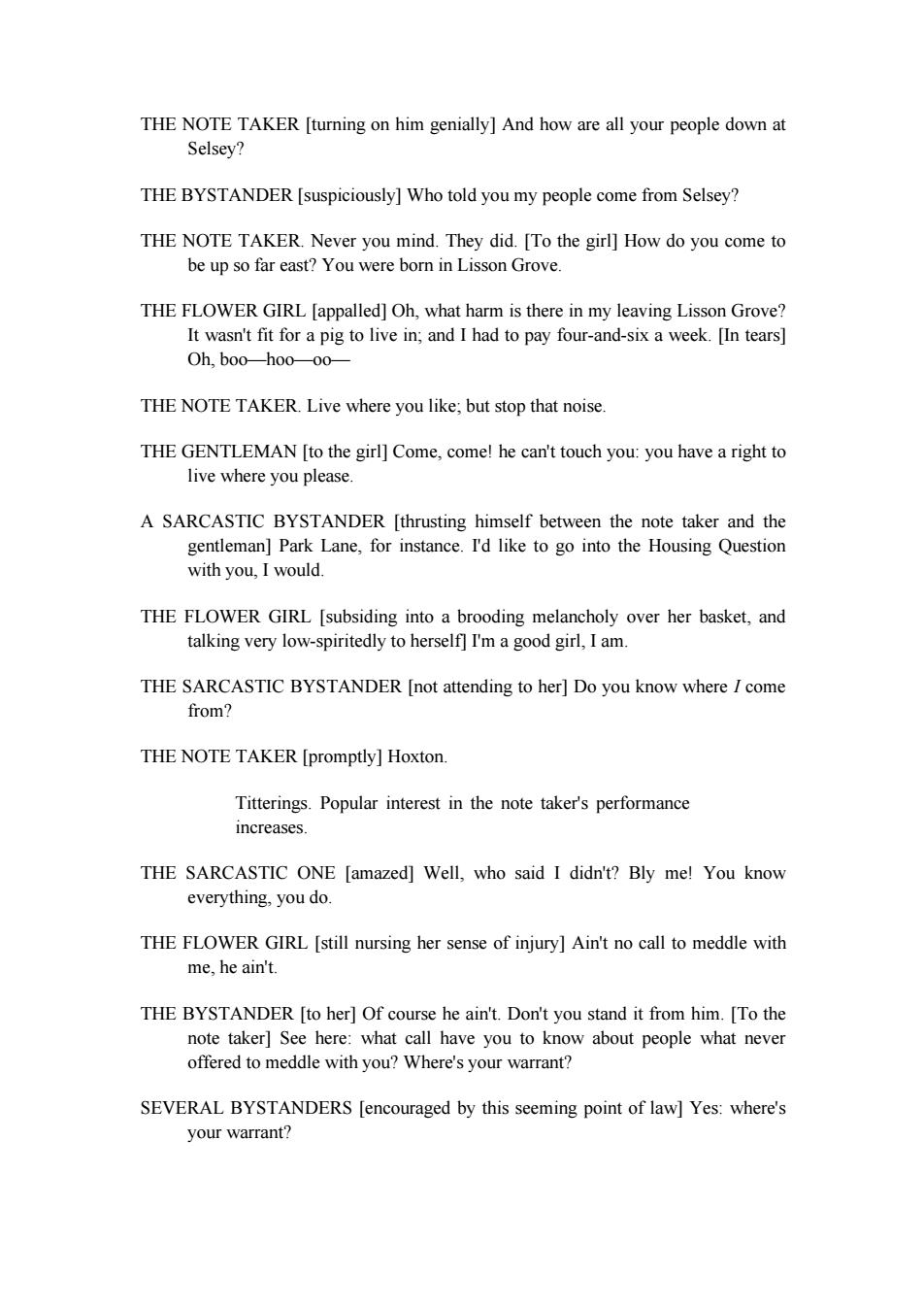
THE NOTE TAKER [turning on him genially]And how are all your people down at Selsey? THE BYSTANDER [suspiciously]Who told you my people come from Selsey? THE NOTE TAKER.Never you mind.They did.[To the girl]How do you come to be up so far east?You were born in Lisson Grove. THE FLOWER GIRL [appalled]Oh,what harm is there in my leaving Lisson Grove? It wasn't fit for a pig to live in;and I had to pay four-and-six a week.[In tears] Oh,boo-hoo-oo— THE NOTE TAKER.Live where you like;but stop that noise. THE GENTLEMAN [to the girl]Come,come!he can't touch you:you have a right to live where you please. A SARCASTIC BYSTANDER [thrusting himself between the note taker and the gentleman]Park Lane,for instance.I'd like to go into the Housing Question with you,I would. THE FLOWER GIRL [subsiding into a brooding melancholy over her basket,and talking very low-spiritedly to herself]I'm a good girl,I am. THE SARCASTIC BYSTANDER [not attending to her]Do you know where come from? THE NOTE TAKER [promptly]Hoxton. Titterings.Popular interest in the note taker's performance increases. THE SARCASTIC ONE [amazed]Well,who said I didn't?Bly me!You know everything,you do. THE FLOWER GIRL [still nursing her sense of injury]Ain't no call to meddle with me,he ain't. THE BYSTANDER [to her]Of course he ain't.Don't you stand it from him.[To the note taker]See here:what call have you to know about people what never offered to meddle with you?Where's your warrant? SEVERAL BYSTANDERS [encouraged by this seeming point of law]Yes:where's your warrant?
THE NOTE TAKER [turning on him genially] And how are all your people down at Selsey? THE BYSTANDER [suspiciously] Who told you my people come from Selsey? THE NOTE TAKER. Never you mind. They did. [To the girl] How do you come to be up so far east? You were born in Lisson Grove. THE FLOWER GIRL [appalled] Oh, what harm is there in my leaving Lisson Grove? It wasn't fit for a pig to live in; and I had to pay four-and-six a week. [In tears] Oh, boo—hoo—oo— THE NOTE TAKER. Live where you like; but stop that noise. THE GENTLEMAN [to the girl] Come, come! he can't touch you: you have a right to live where you please. A SARCASTIC BYSTANDER [thrusting himself between the note taker and the gentleman] Park Lane, for instance. I'd like to go into the Housing Question with you, I would. THE FLOWER GIRL [subsiding into a brooding melancholy over her basket, and talking very low-spiritedly to herself] I'm a good girl, I am. THE SARCASTIC BYSTANDER [not attending to her] Do you know where I come from? THE NOTE TAKER [promptly] Hoxton. Titterings. Popular interest in the note taker's performance increases. THE SARCASTIC ONE [amazed] Well, who said I didn't? Bly me! You know everything, you do. THE FLOWER GIRL [still nursing her sense of injury] Ain't no call to meddle with me, he ain't. THE BYSTANDER [to her] Of course he ain't. Don't you stand it from him. [To the note taker] See here: what call have you to know about people what never offered to meddle with you? Where's your warrant? SEVERAL BYSTANDERS [encouraged by this seeming point of law] Yes: where's your warrant?